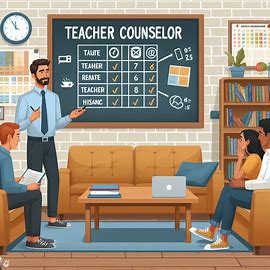However, it is essential to prioritize maintaining a healthy work-life balance to prevent burnout and ensure your overall well-being. Here are some useful tips for school counselor professionals to maintain harmony between their personal and professional lives while excelling in their roles:
1. Set Boundaries: Establish clear boundaries between work and personal life. Determine working hours that allow you to fulfill your job responsibilities while leaving ample time for your personal commitments and interests. Communicate these boundaries to your colleagues and superiors, ensuring everyone understands your availability outside of working hours.
2. Prioritize Self-Care: It’s crucial to prioritize self-care to prevent burnout and maintain your overall well-being. Engage in activities that help you relax and recharge such as exercising, practicing mindfulness, pursuing hobbies, or spending quality time with loved ones. Schedule regular self-care activities and make them non-negotiable parts of your routine.
3. Delegate and Collaborate: Don’t hesitate to delegate tasks or work collaboratively when possible. School counselors often have a diverse range of responsibilities, and sharing the workload can help alleviate stress. Collaborating with colleagues can also foster a supportive work environment and create opportunities for professional growth.
4. Learn to Say No: As a dedicated professional, you may feel compelled to say yes to every request or opportunity that comes your way. However, it’s important to learn to say no to prevent overload and ensure you can give your best to the tasks you commit to. Prioritize your workload and evaluate opportunities based on their alignment with your personal and professional goals.
5. Practice Time Management: Effective time management is essential for maintaining a healthy work-life balance. Prioritize tasks based on urgency and importance, set realistic deadlines, and create a daily or weekly schedule to keep track of your responsibilities. Break larger tasks into manageable chunks to enhance productivity and prevent feeling overwhelmed.
6. Disconnect from Technology: In today’s highly connected world, it’s essential to disconnect from technology regularly. Constantly checking emails or being available for work-related matters beyond working hours can blur the boundaries between your personal and professional life. Establish specific periods of time, such as evenings or weekends, to unplug from work-related devices and focus on personal activities.
7. Seek Support and Resources: Don’t shy away from seeking support when needed. Engage with your professional network, attend conferences or workshops, and seek mentorship opportunities. Connecting with others in your field can provide valuable insights and resources to help manage your workload effectively.
8. Reflect and Reassess Regularly: Take time to reflect on your work-life balance regularly. Assess whether adjustments need to be made to ensure you maintain a healthy equilibrium. Identify any challenges or areas of improvement and take proactive steps to address them, whether it’s reaching out for support or adjusting your routines.
Remember, maintaining a healthy work-life balance is an ongoing process that requires conscious effort and regular self-evaluation. By prioritizing self-care, setting boundaries, and seeking support, school counselors can not only excel professionally but also enjoy a fulfilling personal life. Balancing the demands of work with personal well-being is vital for your long-term success and happiness.
